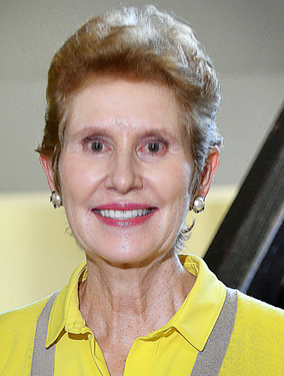
A platform that encourages healthy conversation, spiritual support, growth and fellowship

NOLACatholic Parenting Podcast
A natural progression of our weekly column in the Clarion Herald and blog

The best in Catholic news and inspiration - wherever you are!
Ursuline ‘blazes’ a diverse trail toward inclusion
-

“Empowering Trailblazers,” Ursuline Academy’s maxim, is an aspiration that stems from its founder St. Angela Merici, who broke all molds in 1500s Italy when she created the first teaching congregation of women.
This became the Company of St. Ursula, forerunner to the Ursuline nuns, the oldest religious order in America dedicated to the education of girls.
Ursuline Academy interim president, Colombian-born Dr. Margarita O’Byrne Curtis, a 1969 alumna, first enrolled at Ursuline at age 12 not speaking a lick of English. She fondly remembers “the warmth and support with which I was met by teachers and students alike” and wants the same experience for current students of all backgrounds.
“We want to blaze a trail toward inclusion,” she said.
Effect of current events

After witnessing the recent racial injustices in the U.S., when Curtis returned to her alma mater this spring, she pondered how Ursuline could “demonstrate – not just hashtag,” that Black lives matter.She consulted faculty, administrators, educators at other Catholic institutions and alumnae, including board of trustees chairwoman Jessica Kennedy Becker ’89, to create a “Diversity, Inclusion and Belonging Task Force.” The task force aspires to develop “a comprehensive strategic plan” that addresses inclusion and racism in a “constructive, sensitive, yet deliberate manner,” so that all voices are heard.
“The overarching goal is to systematically assess all areas of school life, as well as governance and operational structures and determine how we can enhance our cultural competency skills and create an ever more inclusive, welcoming community,” said Curtis, who has undergraduate degrees from Tulane and Minnesota State University. She received her master’s and doctoral degrees in Romance languages and literatures at Harvard.
Task force members were divided into six concentrated work streams: admissions; human resources and finance; student life; academics; advancement; and communications.
“It’s an ongoing learning process,” Curtis said. “As a Catholic educational institution, our primary purpose is to equip young people with the values and skills that will allow them to lead good, moral, consequential lives.
“As a teacher, it’s never just about imparting knowledge in a particular area or developing academic skills, legitimate as those goals are. You are also shaping character and helping calibrate the moral compass of students. What are the values that will inform their lives?”
Curtis is no stranger to the need for inclusion on a school campus. Since leaving New Orleans in 1979, Curtis has taught or been in administration at the prestigious boarding schools Phillips Academy in Andover and Deerfield Academy in western Massachusetts, as well as at Harvard University. Learning to be inclusive was organic, with the needs of boarding students – many of whom were minorities or foreign students – presenting themselves.
“It’s one thing to get people of diverse backgrounds into an institution, but it’s another to make sure the experience there is equitable and that all students feel valued and affirmed,” Curtis said. “It’s important to get students of different backgrounds to interact regularly with one another so they can gain greater awareness of one another’s talents and needs, and also a deeper understanding of how to build community spirit. Athletics and the performing arts, for example, are great venues for the kind of collaboration that breaks down barriers or biases, and that leads to healthy, vibrant, trusting communities.”
Even her experiences as an immigrant didn’t fully open her eyes to what today’s students needed. She realized even full academic scholarships were limited in allowing students to participate in some expensive extracurriculars. She began talking directly to students to learn true needs.
“We created a supplemental aid package that ‘leveled the playing field’ so scholarship students had access to every education program,” she said.
At Deerfield, Curtis said a consulting firm helped the school identify 13 skills on which to build for inclusion. One or two a month was woven into school life.
She said involving faculty, students and parents in the process allowed everyone to see situations from one another’s perspective. Only then did they understand what was needed to create a more equitable environment for students.
Curtis calls this “cultural competency.” She believes that by equipping students of diverse backgrounds and experiences with the ability to listen attentively and to put themselves in one another’s shoes, “they will be better prepared to interact productively, to build consensus and to find solutions to complex problems” in real-world situations and workplaces as adults.
At Ursuline, “we want to affirm the uniqueness of each student and to teach our girls to understand and appreciate differences and to view the community’s diversity as an opportunity to learn and grow from one another, not as something to be shunned,” she said.
“I’m a big believer that diversity can be a real plus,” said Curtis, who has been appointed to Archbishop Gregory Aymond’s Committee for Racial Equity and Justice that is reviewing archdiocesan policies and procedures to meet the Gospel mandate to address injustices where they exist.
Curtis sees Ursuline today as more representative of the city’s demographics than when she was there and thinks this diversity prepares students for the future and affirms the Christian values of justice and peace in their communities.
“Ursuline girls are encouraged to work hard and to learn in order to lead and serve,” Curtis says. “In these troubled, unprecedented times, I cannot think of a more critical need than the disposition to blaze a trail toward mutual understanding and inclusion.”




